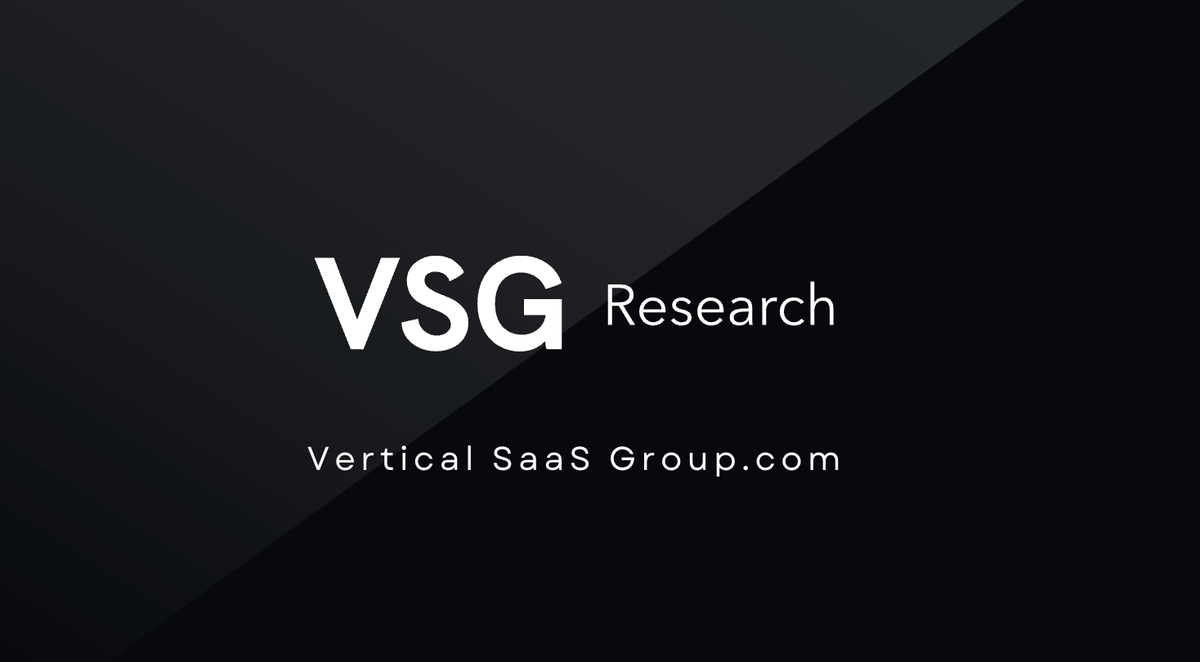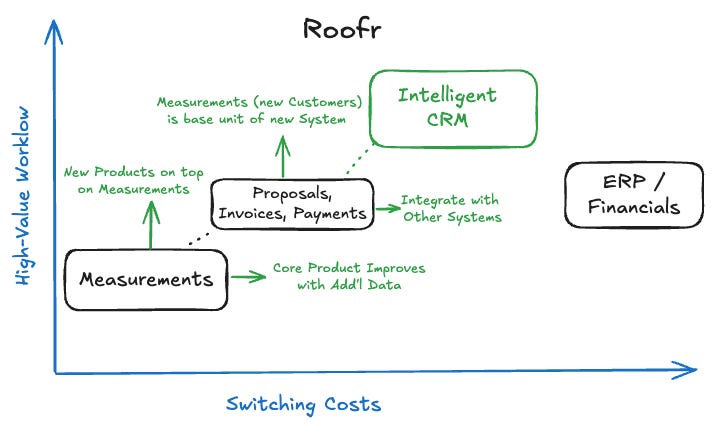#112: Religious Orgs Industry Scorecard, Sales Is Slowwwww, The Story of Roofr & Their New Series B
One vSaaS breakdown. One biz story. One 'how to'. In your inbox once a week.
Todays newsletter is sponsored by Check, the leading payroll infrastructure provider and pioneer of embedded payroll.
Check makes it easy for any SaaS platform to build a payroll business, and already powers 60+ popular platforms supporting 20M+ employees such as Wave, Homebase, and HousecallPro .
Alright, let’s get to it…
One Vertical SaaS Breakdown:
Religious Organizations Industry Scorecard
Thinking about building a software business?
The market you pick is far more important than your idea.
Here's an industry scorecard on building vSaaS for Religious Orgs ⬇
The US Religious Organizations market is projected to grow from 124 billion in 2023 to 140-145 billion by 2028.
With over 350,000 religious organizations and 380,000+ congregations, it's a significant industry.
Changing religious affiliations and increasing online services are reshaping the landscape.
The industry employs around 1.7 million, with 400,000 full-time clergy and 800,000 support staff.
Volunteers play a crucial role but aren't counted in official employment figures.
The "Bible Belt" (Southeast) has the highest concentration of religious organizations, while urban areas have the most diverse religious organizations.
Physical infrastructure setup, organizational structure development, and core religious services are just a few of the operational processes religious organizations must manage.
From planning events to financial management, it's complex!
Software solutions like FaithTech Solutions, Dacast, and Tithely are revolutionizing how religious organizations manage their operations.
https://www.loom.com/share/cbebb1257661468eb016bfff6f22e445?sid=8d51322f-73de-42bc-8987-d3176b9489b0
From digital giving to live streaming, technology is making a big impact.
If you're looking at building a solution for the space. A few opportunities exist:
1) Digital giving, mobile giving, and recurring donation systems
2) Multi-currency support for international mission work and cross-border donations.
3) AI for predictive analytics, automated follow-ups, and personalized communication recommendations.
4) Consolidating management systems, communication tools, and educational resources can streamline operations and improve user experience.
As the industry evolves, religious organizations are embracing digital transformation, multi-cultural outreach, and community service programs.
The future looks bright with continued innovation and adaptation.
I use VSG's AI Resarch App to run these reports.
You can run your own industry report (and chat to an AI about it) over at:
One ’How To’:
Sales Is Slowwwwww
Most vertical SaaS companies deploy an inside or outside sales model that makes up the majority of their go-to-market motion.
For example At my business, CourseKey, we had a heavy outside-sales model. While this was great in driving $100K+ average deals it was incredibly slow. We’re talking 6-18 month cycles.
If you’re not running an outside sales motion as a vertical SaaS, your probably running an inside sales motion - relying heavy on cold email/phone to drum up leads and opportunities. This is especially true for those serving SMB’s. Toast, ServiceTitan, HouseCallPro, and Weave are all inside sales examples, with armies of people that live or die on the phone.
The problem with both these models is that they usually far slower than product or marketing led customer acquisition.
vSaaS companies will tell you the reason they have to deploy these approaches is due to their industry, that they’ve tried and failed at product and marketing led GTM’s, and that in said industry this is the only way it works.
I will be the first one to tell you that that was the case with selling software to Trade Schools.
But I think vertical SaaS needs to evolve. It’s not about running a classic product or marketing led GTM motion, you know the same motion that we all know about. It’s some unique take on it, some different flavor of ice cream. A unqiue take.
If you were to ask me 5 years ago, that Roofr would scale incredibly fast in the home services market with a marketing-led GTM I would tell you it probably wasn’t going to happen. HousecallPro and ServiceTitan both went all-in on inside sales, so a marketing-led approach probably just didn’t work.
But Roofr defied what, at the time, was considered “gravity” to operators, to investors, to us all. They created a free product that a roofing company would be foolish not to leverage, IE use this free tool and don’t wait for leads to convert, convert them immediately with our technology. It was so simple that they could communicate it via digital ads. So thats what they did, and they got a ton of customers that they could then sell their CRM to. Their inside sales motion was solely to the customer base. You know who picks up the phone when you call? A customer. You know who usually doesn’t? A prospect.
So just remember that the existing playbooks, are, just that. Playbooks. They’ve worked, we’ve seen them work, but there is always a new way. So it may not be proven yet, but it doesn’t mean it’s not worth taking a shot.
You may just defy gravity.
So, in honor of Roofr, our biz story this week is on them below:
One Biz Story:
Roofr’s Series B
Roofr just announced a big Series B round led by TCV. I’ve talked about Roofr before and think they had one of the most beautiful wedge products I’ve seen in quite some time.
Euclid also did a fantastic write-up on them and their approach to vertical AI. I borrowed the infographic from the folks there because it greatly illustrates their wedge, and how they’ve evolved over time.
So big kudos to the Roofr team.
I pulled the formal announcement from their blog and copied it here:
[San Francisco, Jan 28 2025] — At Roofr, we have always made it our priority to be people-first. We believe that starts with listening to our customers and our team. Since Roofr’s inception in 2016, our team has focused on connecting with roofers, hearing their ideas and common frustrations, and building a product they want and need to help grow their businesses. We’ve spent late nights, early mornings, and weekends replying to Facebook comments in roofing groups, calling our users for feedback, and attending trade shows to get honest opinions on what we can do better. Guess what? It worked.
We have taken that feedback and moved quickly. We built an end-to-end roofing platform that is powerful, fast, and effective. We built scalable tools like measurement reports, lead capturing, proposals, payments, invoicing, material ordering, workflow automation, event tracking, job boards, customer communications, and much more. We spoke with experts, both in roofing and in technology, to make our platform easy to use and even easier to implement into everyday operations. Most importantly, we designed it to work the way a roofing business does, and priced it at a point we knew roofing businesses could afford. We focused on creating products and features that make roofers' lives easier, giving them more time back to reinvest however they saw fit. Many have scaled their businesses, some grossing millions since using the Roofr platform, and all getting more time back to spend with loved ones.
It may sound straightforward: “build what your audience wants to buy”. It’s simple in theory, yet hard to achieve. We saw other tech companies build too many features users didn’t need, and we were adamant about not making the same mistakes. We spoke at length, debated, and challenged each other to build something that would feel natural to use every day, and be easier to use than roofers current methods. Now, over 12,000 roofing companies rely on Roofr, and as our customer base grows, so does our company, product suite, and customer expectations. That means more people, more decisions, and more at stake. There were two truths Roofr Founder & CEO, Richy Nelson, always held steadfast: the first, listen to your users no matter what; the second, create a culture where people want to come to work. With this investment, Roofr will continue to grow by these principles.
For us, a product is only as good as the people who build it. It’s why we have focused so intently on hiring the right people. We don’t prioritize fancy degrees or accolades. We prioritize great ideas, customer obsession, leaders with empathy, and individuals who think unconventionally. From 10 people to 150+, Roofr's culture has remained rooted in these values. Through dedication, patience, and careful intention Roofr has built a remote environment where people are excited to log in to work every day. By focusing on creating a world-class culture, we in turn have created a world-class product. Now, it’s time to grow our team and platform faster than ever before.
In 2025, Roofr will become the leading operating system that every roofing company needs to scale their business. This round of funding was led by TCV, a venture firm that has supported category-defining companies like Netflix, Spotify, Facebook, Zillow, and Airbnb as well as vertical SaaS leaders like Toast and Clio. ABC Supply, Crosslink Capital, Euclid Ventures, MGFO, and i2BF have also contributed to this round of funding to help reach our goal of hiring talented people to deliver on our product roadmap faster than ever. This includes new products and features like canvassing, marketing, document builder, job costing, work orders, and more.
Tim McAdam, General Partner at TCV, shared the firm’s enthusiasm for Roofr. "We sought out the opportunity to invest in Roofr because of the teams deep industry knowledge and their innovative, customer-first approach to building a roofing software suite filled with productivity enhancing products. We heard from many happy Roofr customers about the quality and breadth of Roofr’s platform and are excited to support the company’s mission of enabling these business owners to be more successful. We believe their technology and services will not only enhance the success of roofing businesses but also modernize the roofing industry.”
With this funding, we plan to hire new teammates in product, engineering, sales, support, customer success, G&A, and marketing. It means big things are coming, and we’re making it our number one priority to find the right people to help make it happen.
Have a product or service that would be great for our audience of vertical SaaS founders/operators/investors? Reply to this email or shoot us a note at ls@lukesophinos.com







